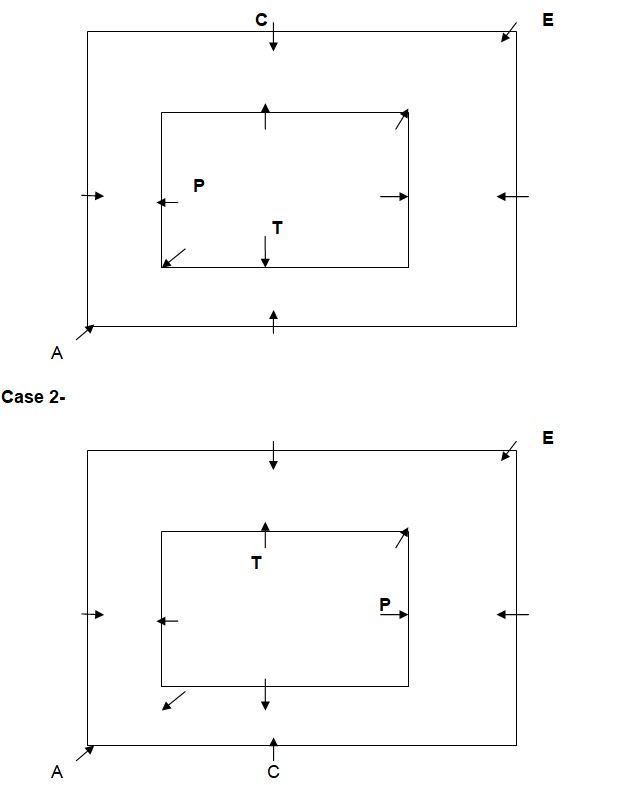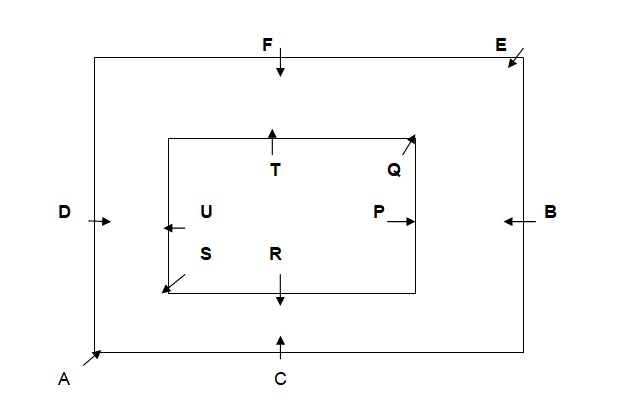Question
Who is sitting on the third right of
C? Study the following information and Answer the questions below: In a ground there are 2 benches in rectangle form. One rectangle is inside another. Twelve people went to the ground and sit on the benches i.e on two different rectangles-one inside another. A, B, C, D, E and F are in the outer rectangle facing inward. P, Q, R, S, T and U are sitting in the inner rectangle facing outward. They all are sitting in such a way that in each rectangle four persons are sitting in the middle of the sides and two persons are sitting on diagonally opposite corners. Each friend in the inner rectangle is facing another friend of the outer rectangle. A sits on any of the corner. There are exactly two persons sitting between A and E. T sits second to the left of P. D is facing U and B is not opposite C in the outer rectangle. C is on the immediate left of the one who is facing P. Neither T nor P faces either E or A. E is not sitting adjacent to D. Q is not facing A. There are as many persons as between Q and S and C and F.Solution
Sol- A sits on any of the corner. There are exactly two persons sitting between A and E. T sits second to the left of P. Neither T nor P faces either E or A. C is on the immediate left of the one who is facing P. We will see two cases for it- Case 1 –  D is facing U. E is not sitting adjacent to D. Now case 1 gets eliminated here. We will continue with case 2. B is not opposite C in the outer rectangle. So B must sit adjacent to E and opposite to P. Q is not facing A. There are as many persons as between Q and S and C and F. F will sit opposite to T in the outer circle as only that place is left for it. So between C and F there are two persons, so between Q and S also two persons will be there, so Q sits opposite to E and S sits opposite to A. And now only R left to sit opposite to C in the inner circle. Thus the final arrangement – Case 2 –
D is facing U. E is not sitting adjacent to D. Now case 1 gets eliminated here. We will continue with case 2. B is not opposite C in the outer rectangle. So B must sit adjacent to E and opposite to P. Q is not facing A. There are as many persons as between Q and S and C and F. F will sit opposite to T in the outer circle as only that place is left for it. So between C and F there are two persons, so between Q and S also two persons will be there, so Q sits opposite to E and S sits opposite to A. And now only R left to sit opposite to C in the inner circle. Thus the final arrangement – Case 2 – 
Ratio between two numbers is 9:14 and their difference is 55. Find the sum of the given two numbers.
A stone worth Rs.4800 drops and breaks with weight in the ratio 1:3:4. The price of stone is directly proportional to square of its weight. Find the tot...
Ratio of number of book to number of pen sold by a shopkeeper is 23:15, respectively while ratio of number of pen to number of pencil sold by the same s...
The salaries of A and B are in the ratio 5 : 7. They both get an increment of ₹6000 each, and their new salaries are in the ratio 3 : 4. Find their or...
Three numbers ‘P’, ‘Q’ and ‘R’ are such that ‘P’ is one-third of ‘Q’ and ‘R’ is equal to the average of ‘P’ and ‘Q’. If...
A, B and C entered into a partnership by investing in the ratio of 6:3:4. At the end of the year, the total profit is in the ratio of 12:3:8. Find the r...
Marks scored by A and B in a test are in the ratio 12:7 respectively. If B had scored 6 more marks, then marks scored by A would be 20% more than that o...
Marks scored by A and B in a test are in the ratio 13:6 respectively. If B had scored 4 more marks, then marks scored by A would be 30% more than that o...
Find the mean proportion of 81 and 324.
Two years ago the ratio of annual salary of three friends P, Q and R is 4 : 3 : 5. Every year since then the salary of P, Q and R increases by 10%, 12% ...



